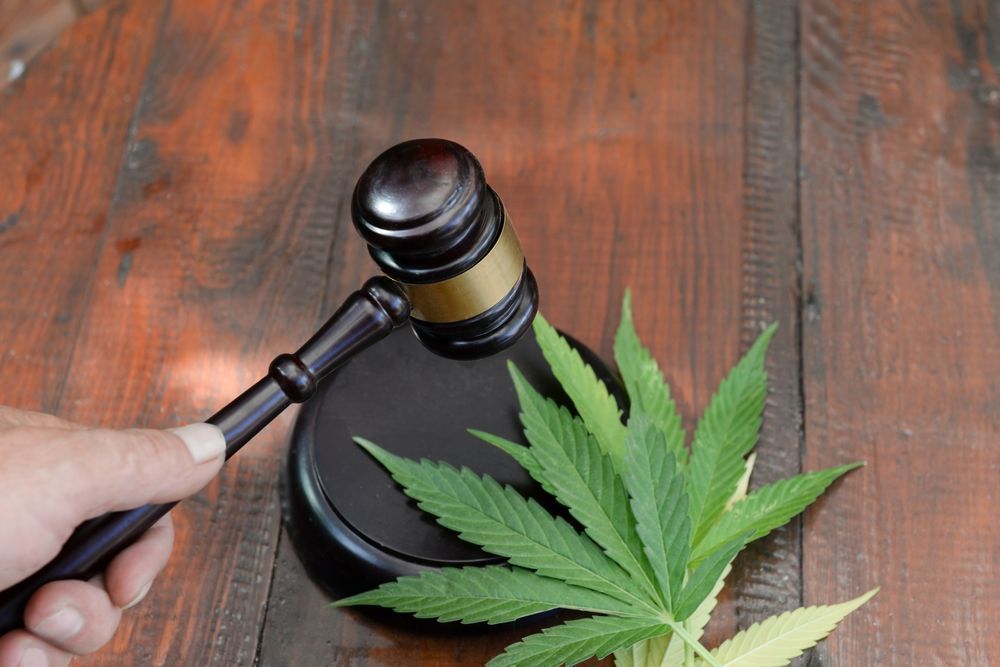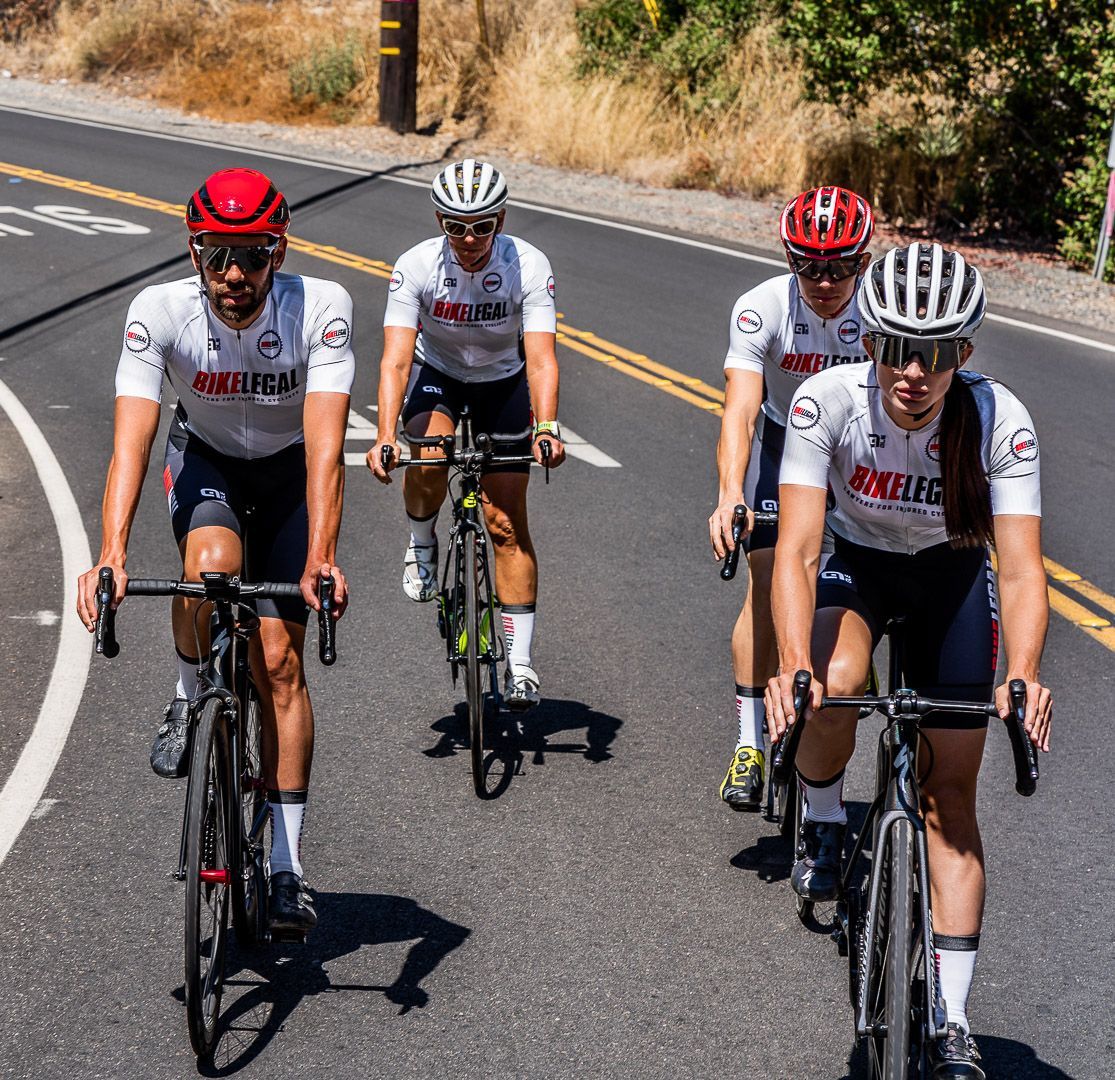Cycling Under the Influence: Marijuana DUI and Bicycle Accidents
Follow us on
social media!
Cycling Under the Influence: Marijuana DUI and Bicycle Accidents

In the shifting landscape of cannabis legalization, a new road hazard emerges - cycling under the influence of marijuana. It's a topic that rides the fine line between personal freedom and public safety, challenging preconceived notions about what it means to be "under the influence" on two wheels. If you've ever wondered about the legal tightrope of biking while buzzed, you're in the right place.
This article will guide you through:
- How long after using marijuana should you wait to bike/drive?
- The legal consequences of cycling under the influence of marijuana and its impact on bicycle accidents.
- Eye-opening statistics and studies highlighting the risks and realities of biking while high.
- Practical advice to steer clear of accidents caused by marijuana impairment.
- Where to find legal support if you're navigating the aftermath of a marijuana-related bicycle accident.
How Long After Smoking Marijuana Should You Wait to Bike/Drive?
Some research points to noticeable driving impairment lasting up to 12 hours post-consumption. However, this duration can swing widely depending on:
- The type of marijuana product used
- The amount consumed
- Individual metabolic differences
- If marijuana was combined with alcohol consumption
The stakes include not just legal repercussions, like DUI charges, but also the heightened risk of accidents due to intoxication. Given these serious considerations, the most cautious approach is to wait 8-12 hours before biking, driving or engaging in any safety sensitive activities.
Navigating the decision of when it's safe to drive after indulging in marijuana is a complex puzzle with no universal solution. Dr. Keith Humphreys from Stanford University sheds light on this intricate issue, emphasizing the significant role of THC concentration in marijuana products, which has seen a dramatic increase over the years.
- Then vs. Now: Back in the 1970s, marijuana typically had a THC content of about 3-4%. Fast forward to today, and you'll find products boasting THC levels of 25% or more.
- Variety and Absorption: The vast array of marijuana products available today, each with different rates of absorption, further muddies the water, making it tough to pinpoint a universally safe waiting period before hitting the road.
Dr. Humphreys' Top Advice: The safest bet? Don't drive if you've consumed marijuana. The lack of a standardized measure for impairment, akin to blood alcohol content for alcohol, coupled with the individual variability in metabolizing THC, makes it challenging to nail down a specific "safe" timeframe.
In essence, while the desire for a clear-cut answer is understandable, the safest course of action is to err on the side of caution and prioritize safety over convenience.
The Legal Consequences of Cycling "High" and Its Impact

Cycling under the influence of marijuana, or any other substance that impairs your ability to operate a bicycle safely, is illegal. Just like driving under the influence of alcohol or drugs, stoned cycling can be dangerous and lead to accidents, injuries, or even fatalities.
While specific laws regarding cycling under the influence of marijuana can vary by state, it is generally considered a violation of traffic laws and can result in penalties such as fines, license suspension, or even criminal charges.
In the wake of marijuana's legalization for recreational use in states like California, a new concern has emerged for cyclists: the legal implications of cycling under the influence of marijuana. While the freedom to ride is cherished, it comes with a responsibility to understand how impairment affects safety and legal standing.
Marijuana and Cycling: A Risky Road
The legalization of marijuana has introduced complex challenges for cyclists and motorists alike. Drugs have now surpassed alcohol as the leading factor in DUI fatalities, with marijuana being a significant contributor.
In 2016, 44% of fatally injured drivers tested positive for drugs, a stark increase from 28% in 2006. This shift underscores a growing danger on the roads, particularly for cyclists, who are inherently more vulnerable due to their exposure and lack of protection compared to vehicle occupants.
Navigating Legal Gray Areas
The legal landscape for cycling under the influence of marijuana remains murky. California's laws, for instance, clearly define alcohol impairment but fall short of specifying the criteria for marijuana impairment.
This ambiguity leaves cyclists in a precarious position, where the standard field sobriety tests, known for their subjectivity, become the measure of impairment. The development of a marijuana breathalyzer aims to offer a more objective assessment, yet its adoption and implementation are still on the horizon.
Cycling under the influence of marijuana, often referred to as CUI (Cycling Under the Influence), carries distinct legal consequences that every cyclist should be aware of. In California, for instance, the law treats CUI with seriousness, albeit with penalties that are less severe than those for driving a motor vehicle under the influence.
Under California Vehicle Code §21200.5, it's illegal to operate a bicycle on the highway while under the influence of alcohol, drugs, or a combination of both. This law underscores the state's commitment to road safety, recognizing that impaired cycling can pose significant risks to cyclists and others.
Key Points About Marijuana DUI Charges
- Legal Definition: The statute defines a bicycle as any device propelled exclusively by human power through a belt, chain, or gears, and having one or more wheels. The term "highway" encompasses natural or publicly maintained areas open for vehicular travel, excluding private roads and driveways.
- Evidence of Impairment: Charges for stoned cycling typically rely on observations of impairment, such as slow and slurred speech, bloodshot eyes, or erratic behavior, rather than a specific legal blood alcohol concentration (BAC) limit.
- Field Sobriety Tests: Suspected individuals may be subjected to field sobriety tests. Additionally, they have the right to request a blood, breath, or urine test to determine drug or alcohol levels.
Penalties for Conviction: A conviction for CUI can result in a fine and a criminal record, which may have broader implications, including affecting employment opportunities and personal reputation. It's crucial for cyclists to understand these potential consequences and take them into account when making decisions about cycling after consuming marijuana.
The Impact on Bicycle Accidents
The impact of THC on a cyclist's ability to navigate the roads safely cannot be overstated. When THC enters the system, it doesn't merely blur the legal lines—it fundamentally alters a cyclist's ability to react to sudden changes, judge distances accurately, and maintain focus.
For instance, a study highlighted by the National Highway Traffic Safety Administration found that cyclists under the influence of marijuana (after confirmed through a blood test) were significantly more likely to misjudge the time it takes to make a safe turn in front of oncoming traffic, leading to a higher incidence of near-misses or collisions.
Moreover, the statistics paint a sobering picture: nearly 25% of all DUI accidents involve marijuana impairment. This figure is not just a number—it's a clear signal that the cycling community needs to prioritize awareness and proactive measures to mitigate these risks.
Pro Tips for Safer Cycling
- Stay Informed: Understand the effects of marijuana on your cycling abilities. Even small amounts can impair your judgment and reaction times.
- Use Safety Gear: Always wear a helmet and reflective clothing, especially if you're riding in the evening. Impairment can reduce your ability to react, making visibility and protection crucial.
- Plan Ahead: If you plan to consume marijuana, arrange for alternative transportation. Consider using ride-sharing services or public transportation to ensure you and others on the road stay safe.
- Educate Yourself and Others: Share information about the risks of stoned cycling with your cycling community. Awareness can lead to better choices.
Tools for Prevention and Education
- Apps: Consider using apps like "WeedMaps" or "Leafly" to understand more about how different strains might affect you differently. While not a substitute for abstaining while cycling, education is key to making informed decisions.
- Online Forums and Communities: Engage with online cycling and cannabis communities to share experiences and tips on staying safe while enjoying both responsibly.
By taking these steps and fostering a culture of safety and responsibility, cyclists can enjoy the road without increasing risks to themselves and others. The goal is not just to reduce the number of accidents involving marijuana impairment but to ensure that every ride is a safe one.
Eye-Opening Statistics and Studies on Biking While Under the Influence of Marijuana

The conversation around biking under the influence of marijuana is gaining traction, especially with the increasing legalization of cannabis across the United States. The Centers for Disease Control and Prevention (CDC) provides some startling statistics that shed light on the risks and realities of biking while under the influence.
A Closer Look at the Numbers:
- In 2018, approximately 12 million U.S. residents aged 16 years and older reported driving under the influence of marijuana in the past 12 months. This figure represents about 4.7% of the population in this age group.
- Additionally, 2.3 million (0.9%) reported driving under the influence of illicit drugs other than marijuana during the same period.
- The prevalence of driving (and implicitly cycling) under the influence of marijuana was notably higher among males (6.2%) compared to females (3.2%) and was most common among persons aged 16–34 years.
- While these numbers are about drivers, cyclists often share the same roads, and therefore share a level of risk every time they choose to bike
- A study of cannabis users in states where it's legal found 82% use the drug before and/or after exercise, with many reporting it increases enjoyment, enhances recovery, and heightens motivation.
These statistics highlight a significant public health concern, as the impairing effects of marijuana on cognitive and psychomotor functions can dramatically increase the risk of accidents on the road, not just for motorists but for cyclists as well.
A comprehensive study published in PubMed Central delves into these attitudes and behaviors, offering a national perspective that sheds light on the prevalence of biking under the influence of marijuana.
Key Findings from the Study:
- Driving After Cannabis Use: The study found that driving after cannabis use was more prevalent in states with legal cannabis sales. This suggests a correlation between the accessibility of legal cannabis and the likelihood of stoned cycling.
- Protective Attitudes in Legal States: Interestingly, in states where cannabis sales are legal, there was also a higher prevalence of protective attitudes related to cannabis use and driving. This indicates an awareness of the risks associated with driving under the influence, even among those in legal states.
- Frequency of Use and Behavior: When grouping by frequency of cannabis use, daily or almost daily users in states with legal recreational cannabis sales reported significantly lower prevalence of driving after cannabis use. They also exhibited a higher prevalence of protective attitudes compared to those from states without legal recreational sales.
- Risk Perceptions: The study highlighted that risk perceptions were generally lower for cannabis than for alcohol, suggesting a potential underestimation of the dangers associated with driving or cycling under the influence of cannabis.
Implications for Cyclists

- Cannabis Legalization and Cycling Safety: The legalization of cannabis brings complexities in user behaviors and attitudes towards biking under the influence, impacting cyclist safety.
- Heightened Risks in Areas with Legalization: In areas where cannabis sales are legal, the impact of acute cannabis use on mental health, and the increased likelihood of becoming an impaired driver. This also includes:
- Poor lane control while biking.
- Impact of acute cannabis use on mental health.
- Greater likelihood of encountering impaired drivers.
- Research on marijuana users shows:
- Protective attitudes vary based on usage frequency.
- Behavioral differences among users can inform public health campaigns.
- Public Health Campaigns and Interventions:
- Nuanced public health initiatives.
- Addressing risk factors like alcohol involvement and drug dependence among drivers.
- Preventative Measures for Cyclists:
- Foster deeper awareness of the risks.
- Adopt preventative measures against stoned cycling.
- Contribute to ensuring safer roads for everyone.
Reinforcing Road Safety Through Public Health Messaging
- The urgency of Public Health Campaigns: Recent studies highlight the critical need for extensive public health messaging across all states, regardless of cannabis legality. The aim is to reduce risks related to cycling and driving under the influence of marijuana.
- Focus on Attitudes and Behaviors: Targeting attitudes and behaviors associated with marijuana use in these campaigns can greatly decrease the risk of accidents caused by impaired drivers, including those influenced by alcohol and other drugs.
- Legal Limits and Testing Challenges:
- California law, along with laws and regulations in other jurisdictions, often sets a legal limit for drug and alcohol levels in the bloodstream, detectable through blood tests.
- Blood tests are used for detection, but the combination of alcohol and marijuana use complicates impairment assessment increasing crash risk.
- Public Health Messages Need:
- The complex interplay between alcohol consumption and marijuana use complicates the assessment of impairment levels.
- Emphasize the increased risk of accidents when mixing marijuana with alcohol or other drugs, promoting safer choices among motor vehicle operators and cyclists alike.
This strategic approach to public health messaging, informed by a deep understanding of drug, alcohol, and dependence dynamics, is essential. It educates and also shifts perceptions, encouraging safer road use.
As recreational cannabis use becomes more widespread, the need for targeted education, backed by rigorous research and policy, becomes more apparent. Such efforts are vital in ensuring the safety and well-being of all road users, paving the way for a future where roads are safer for cyclists and drivers alike.
Practical Advice to Steer Clear of Accidents Caused by Marijuana Impairment
Navigating the roads safely is paramount for cyclists, especially in the context of marijuana impairment. Here's a comprehensive guide to help you avoid accidents and ensure a safe ride every time.
Understand the Effects of Marijuana
- Know How It Affects You: Marijuana can impair judgment, motor coordination, and reaction time. It's crucial to understand how it affects your body and mind, as these effects can significantly compromise your ability to cycle safely.
- Recognize the Delayed Reaction Time: THC, the active ingredient in marijuana, can slow your reaction times. This delay can be critical when you need to make split-second decisions on the road, such as stopping suddenly or avoiding obstacles.
Plan Your Rides Smartly
- Avoid Riding Under the Influence: The simplest way to avoid accidents related to marijuana impairment is not to ride while under the influence. If you've consumed marijuana, consider alternative transportation methods to reach your destination safely.
- Inform Yourself About Local Laws: Awareness of local laws regarding cycling and marijuana use can provide important guidelines for safe and legal cycling practices. Penalties for cycling under the influence can vary, and knowing the laws helps avoid legal troubles.
Use Safety Gear
- Wear a Helmet: A helmet is your best defense against head injuries in the event of an accident. Ensure it fits properly and meets safety standards.
- Invest in High-Visibility Clothing: High-visibility clothing and reflective gear make you more visible to drivers, especially in low-light conditions, reducing the risk of accidents.
Ride Defensively
- Stay Alert: Always be aware of your surroundings. Keep an eye out for vehicles, pedestrians, and other cyclists. Avoid distractions, such as using your phone while riding.
- Signal Your Intentions: Use hand signals to indicate turns and stops to others on the road. Clear communication can prevent misunderstandings and collisions.
- Maintain Your Bike: Regular maintenance checks ensure your bike or other motor vehicles are in good working condition. Check brakes, tires, and lights before each ride to avoid mechanical failures that could lead to accidents.
Educate Yourself and Others
- Spread Awareness: Share information about the risks of cycling under the influence with your cycling community. Education plays a key role in promoting safe cycling habits. Hold each other accountable for agreeing not to ride under the influence.
- Participate in Safety Workshops: Attend cycling safety workshops to improve your skills and knowledge. These can offer valuable tips on navigating traffic, emergency maneuvers, and maintaining your bike.
Seek Alternatives if Impaired
- Use Public Transportation: If you're impaired and need to get somewhere, opt for public transportation. It's a safe alternative that eliminates the risk of cycling under the influence.
- Arrange for a Ride: Plan by arranging a ride with a friend or using a ride-sharing service. It's a responsible choice that ensures both your safety and that of others on the road.
By following these practical tips, cyclists can significantly reduce the risk of accidents caused by marijuana impairment. Remember, the key to safe cycling is not just about following the rules but also about making smart, informed decisions. Stay safe, stay aware, and enjoy the ride responsibly.
Where to Find Legal Support After a Bicycle Accident
Navigating the aftermath of a bicycle accident can be daunting. That's where Bike Legal Firm steps in, offering unparalleled support and expertise in bicycle law. Here's why Bike Legal Firm is your best choice for legal support.
Unmatched Expertise in Bicycle Law
Bike Legal Firm stands out as a law firm specializing in representing cyclists. With a deep commitment to bicycle safety and a track record of helping injured cyclists since 2019, our attorneys possess the specialized knowledge needed to navigate the complexities of bicycle accident cases.
Understanding the nuances of vehicle codes and how they affect cyclists is crucial. Bike Legal Firm's attorneys are not just familiar with these laws; they specialize in them across many states. This expertise is vital in securing the best possible outcomes for their clients.
Client-Centric Approach
Bike Legal Firm operates on a contingency-based, no-fee promise, meaning clients don't pay unless we win. This approach underscores the firm's commitment to its clients' success and well-being.
Unlike many law firms that may pass cases off to legal assistants, Bike Legal ensures that each case is managed by an experienced attorney. This personalized attention guarantees that every aspect of your case is handled with the utmost care and expertise.
Proven Track Record
The firm's dedication to maximizing bike accident compensation is evident in its approach to evaluating claims. We strive to recover every category of compensation our clients are entitled to, a testament to their thoroughness and dedication to justice.
Bike Legal Firm's attorneys have secured millions of dollars for injured cyclists. Our success stories reflect not only their legal acumen but also our passion for advocating for cyclists' rights.
Client Testimonials and Results
Clients of Bike Legal Firm consistently praise the firm's innovative strategies, work ethic, and dedication. This kind of feedback is a testament to the firm's client-focused approach and legal expertise.
If you or a loved one has been involved in a bicycle accident, Bike Legal offers the expertise, dedication, and personalized attention needed to navigate the legal process and achieve the best possible outcome.

Need Legal Help? We're Here For You.
As we wrap up our exploration into the world of cycling, marijuana impairment, and legal recourse, it's clear that the road to recovery after an accident can be complex. But with the right knowledge and support, navigating this path becomes less daunting.
Here are the key takeaways to remember:
- Marijuana impairment affects your cycling abilities; always prioritize safety.
- Equip yourself with the necessary gear and knowledge to prevent accidents.
- In the aftermath of an accident, specialized legal support is crucial.
Bike Legal stands as a beacon for cyclists navigating the aftermath of cycling accidents. Our impressive track record, including securing settlements like $1.25 million for traumatic brain injuries and $1 million for a cyclist who sustained injuries from a collision, underscores their commitment to justice and recovery for cyclists. With Bike Legal Firm, you're not just getting legal representation; you're gaining a dedicated ally committed to your recovery and rights as a cyclist.
Ready to Take the Next Step?
If you or a loved one is facing the challenges of recovering from a bicycle accident, Bike Legal Firm is ready to help. With our specialized knowledge, commitment to cyclists, and proven track record of success, we are the partner you need to navigate the legal landscape and secure the compensation you deserve.
Request a free consultation by calling 877-BIKE LEGAL (877 245-3534) or submitting a form.

